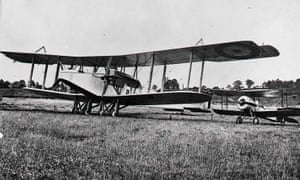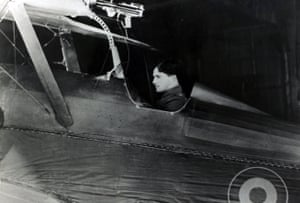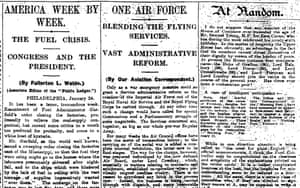"Sailor" Malan under Battle of Britain - Foto: Pinterest
Farnborough 2010 - Foto: Per Gram
How the Guardian and the Observer reported the birth of the
On 1 April 1918, the RAF was formed, becoming a new branch of the British military. It was created by the merging of the Royal Naval Air Service and the Royal Flying Corps, ending an old rivalry.
Editorial: The Fusion of the Air Services
Manchester Guardian, 1 April 1918
To-day the two wings of our Air Service, the Royal Flying Corps and the Royal Naval Air Service, become one, and an old rivalry, which perhaps was not without its value as a stimulus to both sections, but which lost in confusion much more than it achieved by healthy competition, is ended in a single control and an identity of uniform. The Royal Air Force takes the place of the two branches of the service to which we have been accustomed, and air is represented by a single arm, as land and sea have been. An Air Minister is now responsible for the whole of our offence and defence in one element, as the War Secretary and the First Lord of the Admiralty are in the other two. Apart from the use made of aircraft, a great gain should result in the ending of competition between the two branches for the output of the factories, for the needs of the whole front, naval and military, can now be expressed without confusion in the orders given for machines.
But in the employment of the planes a limitless vista opens before the Air Minister. The military value of the air bombardment of cities and the slaughter of non-combatants has not yet been shown. But there has been ample evidence of the immense effect of air bombardment that is concentrated, not on a vast area of city roofs, on which it can make proportionately little impression, but upon the relatively few roads, bridges, and railways that supply an enemy front. When General MAUDE had taken Bagdad it was by aeroplanes raining fire on the Turkish army as it poured northward up the Tigris bank that he completed the rout that has put us in secure possession of the whole Bagdad vilayet.
And in the present tremendous struggle nothing is more significant than the accounts of the havoc played by our airmen among the dense German reinforcements converging on the front. It is clear that, given enough aeroplanes to pour a massed and continuous fire on the German routes to the battle-line, we could have made the present offensive largely futile. If such an accession to the Air Service is to be achieved, it can only be by a control which shall direct the bulk of our whole air output and effort to vital uses, whether on land or sea. That should be the work of the Ministry which to-day assumes control of a united air force.
The Royal Air Force: born amid the thunders of battle
The Observer, 31 March 1918
History will appreciate the fact that the Royal Air Force came into being while the greatest battle ever fought was being waged, and that the aerial arm played a greater part than in any previous battle. To-morrow is the date when the members of our Flying Services become Royal Air Force, and drop the designations Royal Naval Air Service and Royal Flying Corps.
The pang of regret natural at the disappearance of these honoured and glorious names will be tempered by the thought that the change really is one for economy and efficiency. Better still, the Royal Air Force will immediately – do we not know it from the events of the past few days? – win fame that will abide with it, an inspiration during the years to come.
While it is a truism to speak of “healthy competition,” forces which are competitive, yet doing similar work and having practically the same end in view, are apt to pull in opposite directions and so actually retard progress. Under the old conditions there could be no real unity. While the two Air Services were separate it was necessary for each to possess a complete administration. Thus, there existed two staffs practically identical, and not only in one direction but in many was there a good deal of duplication.
The authorities, in appealing to the new Force to effect the fusion without friction, forgetting old jealousies, state that it is desirable that the new uniform should be donned as soon as possible. In this connection a correspondent points out that compliance will bear unfairly upon the pockets of members of the naval branch. Officers of the R.F.C. will not be so much out of pocket. Probably a special grant will be made; but an early announcement to this effect is much to be desired. It is especially hard upon officers of the Royal Naval Volunteer Reserve, those never having received the officer’s usual kit allowance, and always, moreover, having been on a lower scale of pay. At one important naval air station the change of uniform is being made practically obligatory on all officers by about the end of this week.
May one repeat the suggestion made in The Observer a few weeks ago (see below)that the Royal Air Force should adopt the old motto of the Royal Flying Corps, “Per Ardua ad Astra,” unless anyone can suggest a better?









Ingen kommentarer:
Legg inn en kommentar
Merk: Bare medlemmer av denne bloggen kan legge inn en kommentar.